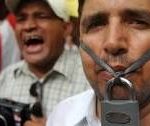Govt looking to resurrect repressive press laws
ISLAMABAD: Apparently not satisfied with the freedom enjoyed by the print media since the courts struck down anti-press regulations introduced in the 1960s, the government has now decided to introduce harsher laws to control the press.
Being prepared to regulate the print media, the proposed law will introduce stringent rules making it mandatory for publishers to seek fresh licences every year to bring out newspapers and periodicals and giving authorities the right to cancel a newspaper’s declaration at will.
The law provides for raids on printing presses and the imposition of penalties, including imprisonment, for violating the new rules and regulations.
Although the body is being established on the Pakistan Electronic Media Regulatory Authority (Pemra) model, the electronic media watchdog is still struggling to exercise its powers over TV channels and FM radio stations.
Though there are reports that the proposed body — Pakistan Print Media Regulatory Authority (PPMRA) — may be established through an ordinance, the proposed draft of the law will be reviewed by the Press Council of Pakistan (PCP) next week.
The draft PPMRA law suggests that the declaration of each newspaper or periodical will only be applicable with an operating licence, which has to be renewed annually.
It has also been suggested that the PPMRA will regulate the distribution of local and foreign newspapers, magazines, books, and other printed media.
It further states: “The authority while preserving the freedom of the press shall maintain highest professional and ethical standards of newspapers, magazines, periodicals etc and news agencies with a view to make them more responsive to the issues of concerns of the society in Pakistan.”
The PPMRA would be authorised to inspect the premises of any print media or distribution service.
It further states: “The print media house or distribution service premises shall at all reasonable times be open to inspection by an authorised officer.”
The PPMRA will also have “powers to investigate and seek any specific information from any person, which the authority may deem useful in order to enable it to determine and dispose of the matter”.
The PPMRA draft has also suggested the formation of an “ethical code of practice for newspapers, news agencies, editors, journalists, and publishers”.
Opposing the draft law, PCP member Nasir Zaidi told Dawn said that the proposed ordinance was nothing more than an attempt to shackle freedom of expression.
“This is a reincarnation of the Press and Publication Ordinance 1960, promulgated under the Ayub regime. That law failed, and this one will never succeed either since we have a parliamentary democracy in place in the country,” the veteran journalist said. That law was struck down by the courts in the 1970s.
In his opinion, the law proposed to make the Ministry of Information and Broadcasting the final decision-making authority in all matters related to the print media and publication of books.
The proposed authority will not only have suo moto powers, it would also enjoy powers to cancel the declaration of any publication that did not comply with a specific set of rules.
Unlike the PCP, where stakeholders have been given significant representation, the majority of the members of this proposed authority will belong to the public sector. Stakeholders’ representation has been reduced to merely four only out of a 12-member body.
Under the proposed law, the PPMRA chairman would be a retired judge of the Supreme Court, or anyone eligible to become an apex court judge. Eight members would be appointed by the government: four eminent citizens, a representative of the Higher Education Commission, the vice chairman of the Pakistan Bar Council, a repetitive of the National Commission on the Status of Women and one mass media communication specialist.
One member each will be drawn from the All Pakistan Newspaper Society, the Council of Newspaper Editors and the Pakistan Federal Union of Journalists (PFUJ), as well as a freelance journalist.
PFUJ President Afzal Butt told Dawn the government’s intentions did not seem sincere, as they had carried out the process of drawing up the law very secretively.
“We have not been consulted at any stage in the drafting of this ordinance by the information ministry,” said Mr Butt. “We received the draft through our sources and have shared it with members of the PFUJ Federal Executive Council, who will give clause-wise comments on it.”
The draft has also been shared with all journalist unions across the country, he said, adding that PFUJ would resist any government move to gag the press.
A detailed response would be issued after receiving feedback from the various unions and FEC members, he concluded.
State Minister for Information and Broadcasting Marriyum Aurangzeb did not respond to repeated requests for comment.

